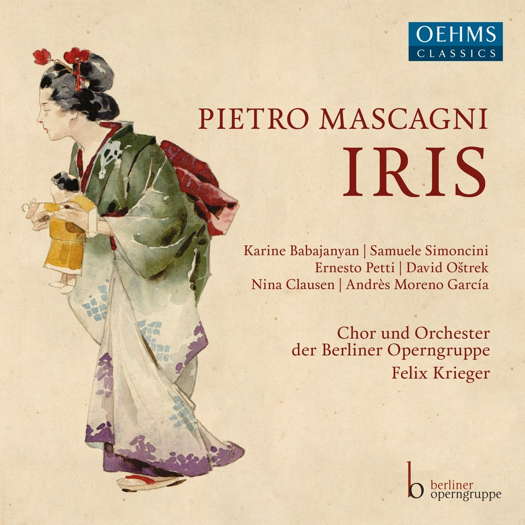- Opera North
- composers of color
- Johann Wilhelm Wilms
- Philip Gossett
- Edmund Kean
- Orchestra of the Royal Opera House
- Tonia Ko
- Stuart Greenbaum
 DISCUSSION: John Dante Prevedini leads a discussion about Music and the Visual World, including contributions from Celia Craig, Halida Dinova and Yekaterina Lebedeva.
DISCUSSION: John Dante Prevedini leads a discussion about Music and the Visual World, including contributions from Celia Craig, Halida Dinova and Yekaterina Lebedeva.
 CENTRAL ENGLAND: Mike Wheeler's concert reviews from Nottingham and Derbyshire feature high profile artists on the UK circuit - often quite early on their tours.
CENTRAL ENGLAND: Mike Wheeler's concert reviews from Nottingham and Derbyshire feature high profile artists on the UK circuit - often quite early on their tours.

Mascagni in a New Garb
GERALD FENECH recommends a new recording of Pietro Mascagni's 'Iris'
'Krieger's exhilarating conducting draws from both his singers and players some truly sublime performances, full of unbridled enthusiasm.'
Pietro Mascagni (1863-1945) is one of those composers whose fame rests on one work, while the rest of his oeuvre is practically discarded. Cavalleria Rusticana brought him fame and fortune at an early age, but at the same time it was also a blessing and a curse. Until 1889, the composer was still struggling to make a breakthrough, but then a stroke of luck came his way in the form of a competition organized by the Sonzogno publishing house for one-act operas. Mascagni submitted a setting of the short story 'Cavalleria Rusticana' by Giovanni Verga, and the piece struck the chord of the age. Not only did the opera win first prize, but also earned the composer overnight fame and immense success. The royalties that Mascagni earned were to provide him with a substantial income for the rest of his life.
Despite all this euphoria, Mascagni did not consider himself to be a verismo composer, and in his later years he did not view Cavalleria Rusticana as his best work. Very soon he was overtaken by an urge to develop his own musical language which, depending on the material, might sometimes be quasi chamber-like, as in his next opera L'Amico Fritz, or also a blend of Verismo, Symbolism and Exoticism, as was to be the case with Iris in a unique way.
Listen — Mascagni: La Notte - Il Primi Albori (Iris)
(CD 1 track 1, 1:58-2:42) ℗ 2020 Oehms Classics Musikproduktion GmbH :
With this opera Mascagni went his own way, but sadly, he never achieved the triumph of Cavalleria, premiered on 17 May 1890. Between 1891 and 1935, the composer wrote another fourteen operas, and in them, Mascagni tirelessly explored how to give his music and dramaturgy a new form of expression, but success was moderate indeed. Maybe Puccini's overwhelming influence on the operatic stage of the time, and his getting involved with the Fascist regime, contributed to Mascagni's lack of favour.
At this stage, a small word on the librettist Luigi Illica would not be amiss. This talented writer co-operated on many librettos of operas that have become justly famous. La bohème, Tosca and Madama Butterfly are prime examples of Illica's ability to create a musical text. His only weakness was his penchant for complicated and, at times, hardly comprehensible verse, but in Iris, despite the implausibility of the story, he did write some wonderful lines.
Listen — Mascagni: Donne, Vampiri della casa, via! (Iris Act II)
(CD 2 track 3, 3:43-4:35) ℗ 2020 Oehms Classics Musikproduktion GmbH :
The idea of penning a first Japanese opera in Italy had been brewing in Illica's mind for a long time, and in Mascagni he saw the ideal partner to bring this project to fruition. Both artists tackled the subject conscientiously, and the premiere, at the Teatro Costanzi in Rome on 22 November 1898, was an encouraging success, despite Puccini's disparaging criticism of the plot. Spread over three Acts, the story centres on the tragic fate of a young Japanese girl who is kidnapped from her home and taken to a brothel. Osaka, the man who is consumed with passion for Iris, and Kyoto, the brothel owner, are both rejected by the girl. Although resisting these advances, Iris is cursed by her blind father, who believes she is immortal. After an extended scene of transformation, Iris jumps to her death, but as the sun rises, the dying girl finds redemption in the power and warmth of the great celestial body.
Listen — Mascagni: Un gran'occhio mi guarda (Iris Act III)
(CD 2 track 17, 3:52-4:51) ℗ 2020 Oehms Classics Musikproduktion GmbH :
Although not in the league of Cavalleria for dramatic intensity, Iris has its moments of melodic beauty, including the majestic 'Hymn to the Sun' that opens and closes the opera, Osaka's Act I aria 'Apri la tua finestra' and the Act II duet 'Come al tuo sottile corpo' between Iris and Osaka.
This is Mascagni in a new garb all of his own and the music is as pleasant as it is tuneful. Still, there are some overblown moments which are eventually offset by other inspirational passages. Krieger's exhilarating conducting draws from both his singers and players some truly sublime performances, full of unbridled enthusiasm. The soloists in particular sing these unusual roles with an emotional ardour that is consistently moving. A beautiful live recording wholly recommended.
Copyright © 22 March 2021
Gerald Fenech,
Gzira, Malta

CD INFORMATION - PIETRO MASCAGNI: IRIS


